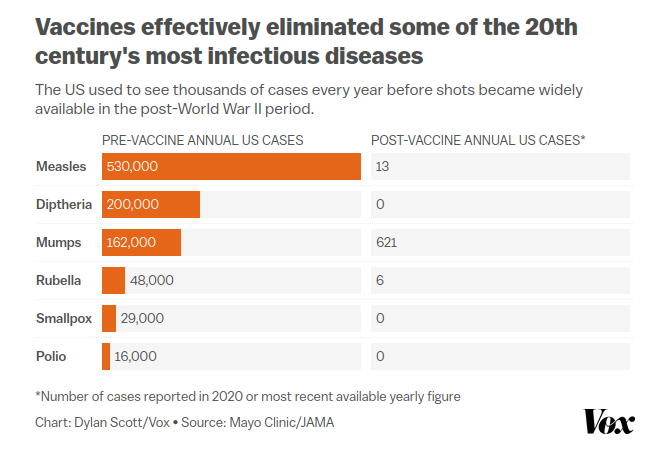Essentials, December 11, 2024
News and commentary for understanding and coping with the years ahead... All corruption, all the time – I Donald Trump Controls

This is a compendium of the reporting and commentary that best explains the America's political, economic, and social conditions – and, most important, how we can find a way back from the dark days ahead. You will rarely find anything here from the New York Times or Washington Post or any of the other Big Journalism companies that failed us so completely during the 2024 elections and are now sucking up – even more than usual – to Donald Trump, his cult, and corporate oligarchs. My focus will be on smaller, more honorable outlets (and individuals). I hope you'll support them with your attention and your money.

Vaccines, alongside sanitized water and antibiotics, have marked the epoch of modern medicine. The US was at the cutting edge of eliminating these diseases, which helped propel life expectancy and economic growth in the postwar era. Montana native Maurice Hilleman, the so-called father of modern vaccines, developed flu shots, hepatitis shots, and the measles, mumps, and rubella (MMR) vaccine in the 1950s and ’60s, which became virtually universally adopted among Americans.
The chart above, from this Vox explainer, tells the story of one of modern science's greatest achievements: the near elimination of childhood diseases that sickened, crippled, and sometimes killed children across the nation. But demagogues and snake-oil salesmen have been on a crusade to undermine public faith in this and other miracles of public health (e.g. masking to mitigate pandemics). They are making inroads, kids are getting sick, and the overall health of Americans – which isn't great to begin with – is declining. So now is just the time to put enemies of vaccinations into high public office? Idiocracy may have arrived, but parents (and everyone else) don't have to join it.
Kudos: Dylan Scott

Today, the relationship between localities and the federal immigration service is hotly contested in Texas, as the federal courts debate Governor Greg Abbott’s efforts to allow local law enforcement to arrest migrants on illegal entry charges, and as Immigration and Customs Enforcement (ICE) continues to rent bed space in Texas jails for migrant detention. Yet these contemporary fights point to an enduring historical reality—mass deportations have long relied on local jails, local police power, and local community support. Even though immigration control is a federal responsibility, immigration officials have spent decades farming the dirty work of detention out to local partners (and later, to private corporations). Working with localities enabled the immigration service to insulate itself from some of detention’s worst abuses, arguing that episodes of violence and neglect were carried out by contractors rather than the federal government itself. Nowhere has this pattern been more evident than in Texas.
This Texas Observer article, by a historian with deep knowledge of the subject, serves as a reminder of several things. First, the Trump regime is serious about mass deportations. Second, Texas will be a key staging ground, and its government is controlled by people who have contempt for migrants. Third, the state has a shameful history of treating migrants with abject cruelty. It will be uglier than you can imagine.
Kudos: Brianna Nofil

[T]he election of Republican party leaders in both chambers, and the consideration of their party rules, plays specifically to the question of whether leaders of the majority parties in both chambers are likely to stand up for Congress as an independent branch of government versus serving as functionaries who will duly implement the directives of the president. Furthermore, should those leaders not stand up, will the factions or individual members of the party exercise veto power over the acquiesce of their chamber to Trump's dictates.
This newsletter post is pretty geeky, as in political insider-ish, but if you have any interest in what happening in Congress (I assume you do) this will help you understand. The author is an expert on these things, and he is pondering the new reality of a Republican Party that is almost totally owned by Trump. The word "almost" applies only at the edges, such as the Senate Republicans' – in a secret ballot – saying no way to Trump's pick for majority leader and picking someone who, in theory, might possibly have a tiny bit of independence. Congress has been handing so much power to the executive branch in recent decades that even it wanted to be relevant, beyond serving as a rubber stamp, it would have to do some work. I learned a lot reading this post.
Kudos: Daniel Schuman

We are living for and within a community that needs our promotion, our protection, and our success in prevailing for them. The community may be large or small, and no matter. What matters is that they see that we are sharing their risks, that we have skin in the game beyond trying to save our paychecks. When you begin to view media in this way – as organizations that provide vital services to a community of practice or interest – you give up certain illusions. One is that everyone cares about what we do. They don’t. From a community standpoint, we are focused first and most on the people who do care. Another is that people will naturally find us if we deliver the right content. That may help, but the fact is that they won’t find us on their own, most of the time. Instead, we must find our communities, or build them. And we have to give up another illusion: A neutral approach to issues and personalities will not succeed with many communities of interest.
This post at The Fix (a site devoted to media management in Europe) may seem to relates only tangentially to our political sphere, but it is deeply political in a core way. It is about the value of core civic institutions, one of which is a useful, honest information ecosystem. The word "community" comes up again and again, and so does the abbreviation SDM, which stands for "stakeholder-driven media". But the need to listen to our communities – with deep respect and with intention to put neighbors' needs ahead of our own egos – does not mean running a question-and-answer site. Journalists should give their communities (of geography and interest) what they want – so long as they want a reflection of reality – but also, as best we journalists can figure out, what they need. Do both from the grassroots outward, and we have a chance at getting it right.
Kudos: Mark Lee Hunter

Some hosts and employees took a realpolitik view of the matter, saying that access to the president-elect is a valuable part of reporting and covering the news. Others said the meeting was a troubling early sign of capitulation to a political leader who MSNBC has portrayed, day after day, as a would-be dictator.
For "realpolitik" you should substitute "political journalism business as usual" – a better way to understand what so many people are doing now that Trump is on the way back to the White House. It's one thing to remain silent in the face of Dear Leader's coming assault on democracy, human rights, social justice, and so much more. It's another to go, hat in hand, and and then see him offer a sneering pretense of believing in freedom of the press. Journalism is an often timid business. Outright cowardice will be the norm unless people who have money and power – as these two do – stand up for what is right.
Kudos: Brian Stelter
I spend a lot of time looking for essential coverage, and hope you'll help me by letting me know about the good stuff you find. Let me know.
Was this forwarded to you? If you would like to have your own free subscription, please click here.